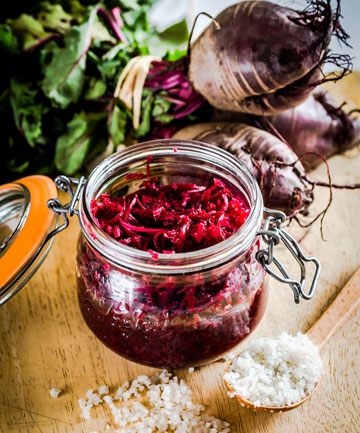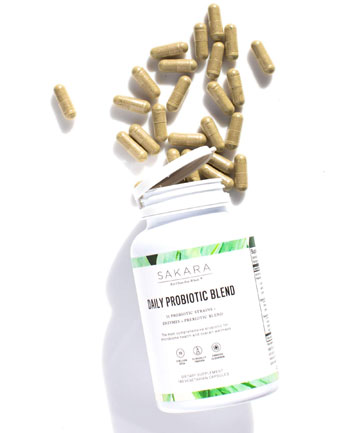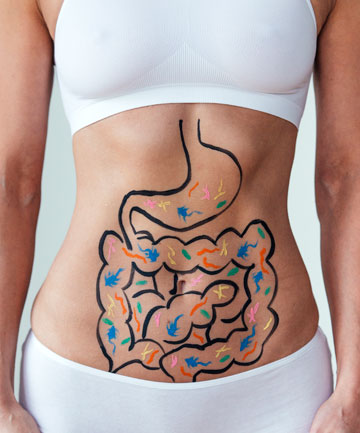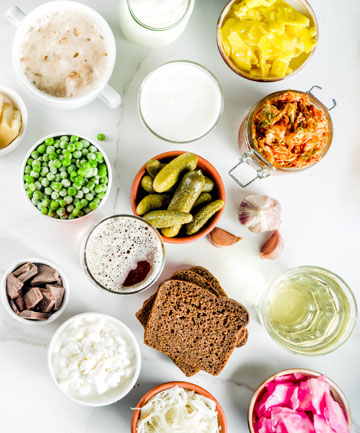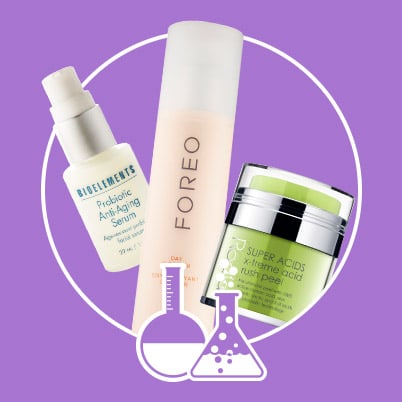In case you haven't heard, probiotics, aka "friendly" bacteria found in food and supplements, are not only key for gut health but for overall health, too. They've become a non-negotiable part of many people's diets — and we're not just talking about the wellness obsessed. If you're loading your plate with sauerkraut and popping a daily probiotic and still feeling bloated and sluggish, however, it might be because you're low in a key piece of the gut puzzle: prebiotics. In the same way that calcium isn't effective without vitamin D, probiotics need prebiotics.
"You need both probiotics and prebiotics to create a symbiotic gut," says Sakara Life co-founders Whitney Tingle and Danielle DuBoise. "There's no one-pill-cure-all with gut health— you'll need to feed those good microbes with a diet abundant in plant fiber, which will help to crowd out any pathogenic bacteria. And a happy gut means so many things: better immunity, deeper sleep, more seamless digestion and elimination, even elevated mood and heightened energy."
Image via Max Oppenheim/Getty
So if probiotics are live bacteria that help keep your digestive tract healthy, what exactly are prebiotics? Simply put: bacteria need to eat. Prebiotics feed good bacteria to keep them healthy and thriving. Good news: Both are easy to find. You can load up on prebiotics via whole foods like apples with skin, Jerusalem artichoke, asparagus, leafy greens, chicory root, barley, bananas, garlic, onions and leeks. As for probiotics, look for them in lacto-fermented foods like kimchi, sauerkraut, kefir and yogurt.
Image via GARO/PHANIE/Getty
Both prebiotics and probiotics are also available — and commonly recommended by wellness experts — in supplement form. "It's important to note, however, that supplements aren't regulated, so choosing quality supplements can be tricky, especially for probiotics because they are live bacteria that need to be alive to work," says Robin Foroutan, MS, RDN, HHC and integrative nutritionist at The Morrison Center. Many probiotic capsules are DOA — dead on arrival. Morrison has his own line of supplements and Sakara Life has the Sakara Daily Probiotic Blend, $46, formulated with prebiotics and probiotics, both of which are considered to be among the best in the market.
If you're unsure as to whether or not you might be probiotic deficient, celebrity nutritionist Dr. Charles Passler says to look for signs of intestinal gas, bloating, constipation or diarrhea, chronic skin irritation disorders, bad breath, sugar cravings and food allergies. Prebiotic deficiencies are often present in people who consume no or low levels of vegetables and/or low fiber diets. "When it comes to symptoms of prebiotic deficiencies, I often see it in people who display only transient benefits from taking high dose probiotic supplements. This may be due to the lack of prebiotics that would have increased probiotic population and colonization in the intestines if they were present in the diet or in supplement form."
If you feel like you have many (or all) of the symptoms outlined by Passler, we have great news: Gut bacteria can rapidly shift through diet. "Studies continue to emerge sharing how the good microbes in your gut can populate mere days after a change in diet. By focusing your plate on diverse, organic, high-quality plants and water-rich foods, the flora in your microbiome can shift for the better and you'll certainly feel the effects," say Tingle and DuBoise.
Image via SolStock/Getty
If you're trying to overcome a diagnosed intestinal health challenge, you're probably going to need to consume live bacteria counts of over 10 billion per dose, Passler says. "You're not going to consume that level of active organisms in your diet without camping out at a pickle factory for a week, so I recommend a good high dose probiotic supplement with a prebiotic fiber blend." For maintaining general health and wellness, he recommends at least one 8-ounce serving of prebiotic and probiotic foods (combined) daily. A supplement is a great security blanket, especially for those making the holiday cocktail rounds!
Image via Rimma_Bondarenko/Getty



